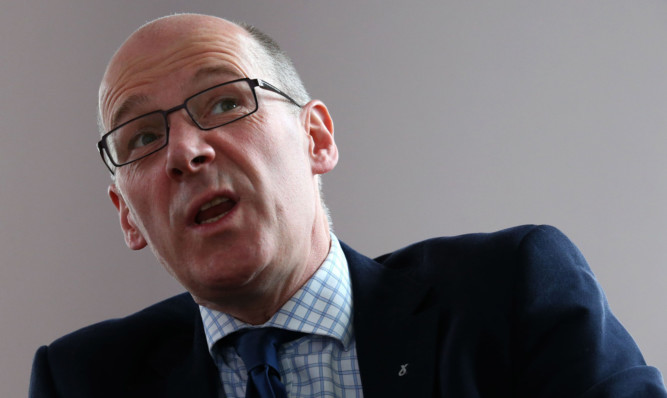Changes to the Scotland Bill could give Holyrood ministers a “better mix of tools” to grow the economy, tackle poverty and create a fairer society, the Deputy First Minister said.
John Swinney was speaking as the Scottish Government published details of how it believes the legislation, which has been brought forward by David Cameron’s Conservative Government at Westminster, could be improved.
The draft clauses proposed by SNP ministers include giving Holyrood full fiscal autonomy, which would see the Scottish Parliament take responsibility for taxation and key elements of domestic expenditure.
The Scottish Government has also set out what powers it believes should be devolved as a priority – including the ability to set the minimum wage, responsibility over employment policy north of the border and responsibility for both working age benefits and benefits related children.
The Deputy First Minister said: “The draft clauses we are publishing today would, if implemented, not only provide for agreement on full fiscal autonomy, but would transfer control of business taxes, the minimum wage, working age benefits, employment and equality laws to Holyrood – new powers that give us a better mix of tools to boost the economy, tackle poverty and build a fairer society.”
Mr Cameron has already made “a clear commitment to consider the proposals the Scottish Government put forward”, Mr Swinney said, adding that he expects Scottish Secretary David Mundell to “honour that commitment”.
The Scottish Secretary and Deputy First Minister are due to hold talks on the Bill later this week.
Mr Swinney said: “It is essential that in taking forward the Scotland Bill and in considering further powers for Scotland, the UK Government takes account of the views of the public and of civic Scotland. In particular, there are real and pressing concerns from many groups about the coherence of the measures that the Scotland Bill currently delivers and on the compressed timescale for the passage of the Bill.
“The Secretary of State needs to commit to proper public engagement, via the UK Parliament and Scottish Parliament committees, and act on the views expressed to ensure the Scotland Bill receives the highest level of scrutiny and delivers the Smith Agreement in full.
“I will meet Mr Mundell later this week and I look forward to constructive discussions on our proposals for more powers and serious consideration and the concerns of stakeholders.”
The draft clauses are suggested changes to the Bill put forward by Scottish ministers, who do not have the power to table amendments to Westminster legislation.
These include a call for Westminster and Holyrood to enter into an agreement “setting out a plan for implementation of full fiscal autonomy for Scotland”.
Devolving power over employment, health and safety, welfare and equalities matters is also proposed, along with a call for business taxes to be transferred in the absence of full fiscal autonomy.
